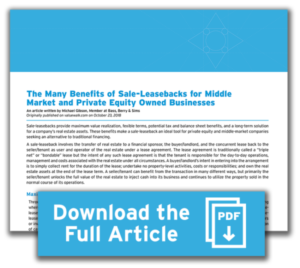 In an article published in ValueWalk, Bass, Berry & Sims attorney Mike Gibson discussed the benefits of sale-leasebacks as an ideal tool for private equity and middle-market companies seeking an alternative to traditional financing. Sale-leasebacks involve the sale of real estate to a buyer, who then leases the property back to the seller, who will act as the operator of the property under a lease agreement that is a “triple net”/”bondable” lease. The operator will then be responsible for the daily operations, management and cost association with maintaining the property. The use of a sale-leaseback allows companies to obtain the full value of real estate assets as cash or value in hand, and any additional cash realized from the transaction can then be used by the company for any purpose, including investments back into the business or returning capital to investors. Additionally, lease agreements in sale-leasebacks allow companies to gain flexibility not found in traditional financing, since there are no bank underwriting restrictions that bind the parties.
In an article published in ValueWalk, Bass, Berry & Sims attorney Mike Gibson discussed the benefits of sale-leasebacks as an ideal tool for private equity and middle-market companies seeking an alternative to traditional financing. Sale-leasebacks involve the sale of real estate to a buyer, who then leases the property back to the seller, who will act as the operator of the property under a lease agreement that is a “triple net”/”bondable” lease. The operator will then be responsible for the daily operations, management and cost association with maintaining the property. The use of a sale-leaseback allows companies to obtain the full value of real estate assets as cash or value in hand, and any additional cash realized from the transaction can then be used by the company for any purpose, including investments back into the business or returning capital to investors. Additionally, lease agreements in sale-leasebacks allow companies to gain flexibility not found in traditional financing, since there are no bank underwriting restrictions that bind the parties.
“Given the long-term nature of the transaction, it is critical that the parties create the flexibility in the lease agreement noted above for a tenant to operate and change its business in reasonable ways throughout the lease term,” said Mike. “The least agreement becomes an important document in the operations of tenant so knowing that the landlord will work with them at key points in the company’s business over a 15-40 year period is critical.”
The full article, “The Many Benefits Of Sale-Leasebacks For Middle Market And Private Equity Owned Businesses,” was published by ValueWalk on October 23, 2018, and is available online.


